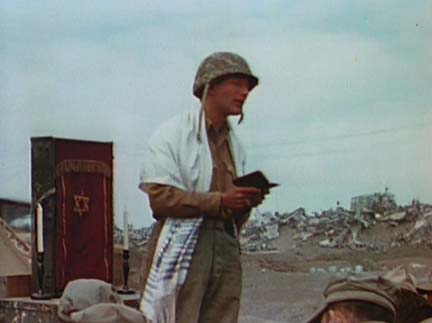
"It's very complex at this point," a Muslim American told the New York Times. The controversy swirling around Park51, the proposed Islamic community center in lower Manhattan is, for some, a difficult issue. But as a Jew, I find the question of my own response simple. The most apt analogies from American Jewish history help me understand why thoughtful Muslim Americans might be conflicted in their response. These analogies suggest that Jews, on the other hand, should unambiguously support Park51. Our role is to stand with the people of good will who want to build the center.
In situating ourselves in this conversation, analogies from other societies seem particularly unhelpful. The ADL's statement claims to find a connection to the Carmelite convent at Auschwitz. I would look closer to home, to the history of Jews in America . We have experience finding our place as a religious minority in this society, one whose ideals would include us but whose reality sometimes falls short.
An episode involving "sacred ground" from World War II seems particularly illuminating. The year was 1945. Rabbi Roland Gittelsohn, as he reports in his autobiography, had been serving with the fighting men on Iwo Jima as the very first Jewish chaplain in the United States Marines. At the end of 35 hellish days of massive losses, the Protestant chaplain in charge of the division planned an interfaith service to dedicate a cemetery on the island for the fallen troops. He asked Rabbi Gittelsohn to preach.
While some of the Protestant chaplains supported the idea, a majority felt that a Jew ought not be praying over Christian dead. It was a time of deep grief and high emotions. Rabbi Gittelsohn ultimately asked his supporters to back down, and three separate services were held: Jewish, Catholic and Protestant.
 Several of the Protestant chaplains decided to boycott their own service and attended the small Jewish one to show support for Rabbi Gittelsohn. They were so taken with his words on that occasion that they asked him for a copy of the sermon. Even without the internet, the text soon went "viral," and ended up becoming a famous document of the war , inserted into the Congressional Record and reprinted, replayed and remembered. Deborah Dash Moore in her book GI Jews: How World War II Changed a Generation reports how interfaith services eventually became standard operating procedure in the military.
Several of the Protestant chaplains decided to boycott their own service and attended the small Jewish one to show support for Rabbi Gittelsohn. They were so taken with his words on that occasion that they asked him for a copy of the sermon. Even without the internet, the text soon went "viral," and ended up becoming a famous document of the war , inserted into the Congressional Record and reprinted, replayed and remembered. Deborah Dash Moore in her book GI Jews: How World War II Changed a Generation reports how interfaith services eventually became standard operating procedure in the military.
This story helps me to understand how a Muslim might see the current situation as complicated. Sometimes there can be a victory lurking in a compromise.
As a Jew, however, I hear one question. Which side would you have been on?
Were I a Christian in 1945, I like to think I would have been in the group that supported the choice to have Rabbi Gittelsohn's speak. I might even have been one of the Protestant chaplains who chose to attend the Jewish service, or at least I hope so. Knowing what we do now, we can see that the chaplains opposing the interfaith service were voicing the parochialism of the past; the visionary chaplain in charge was moving, too quickly for some, toward the future.
The sermon still inspires.
Here lie officers and men, Negroes and Whites, rich men and poor, together. Here are Protestants, Catholics, and Jews together. Here no man prefers another because of his faith or despises him because of his color. Here there are no quotas of how many from each group are admitted or allowed...
When I look at the forces in our society gathering against this project and those in favor of it, it is crystal clear on which side I want to be. I cannot align myself with the forces that have chosen to actively oppose an effort to build a Muslim community center. Others may fail to support Park51 for a variety of reasons, including a genuine sense of the complexity of the situation. But we Jews have too much at stake to risk siding with those who would prefer some and despise others. Our history tells us such people are not our allies. Our hope tells us that they will ultimately not prevail.
While individual cases are always full of nuance, the American trajectory is easier to grasp. The story of religious minorities in America is a story of one group after another moving from maligned outsider to part of the multifaith fabric of our country. As Jews, we know about the stumbles along the way. But we also believe that the arc of history is inclined toward a more respectful, unified and accepting society. I want to be on the side of the future.